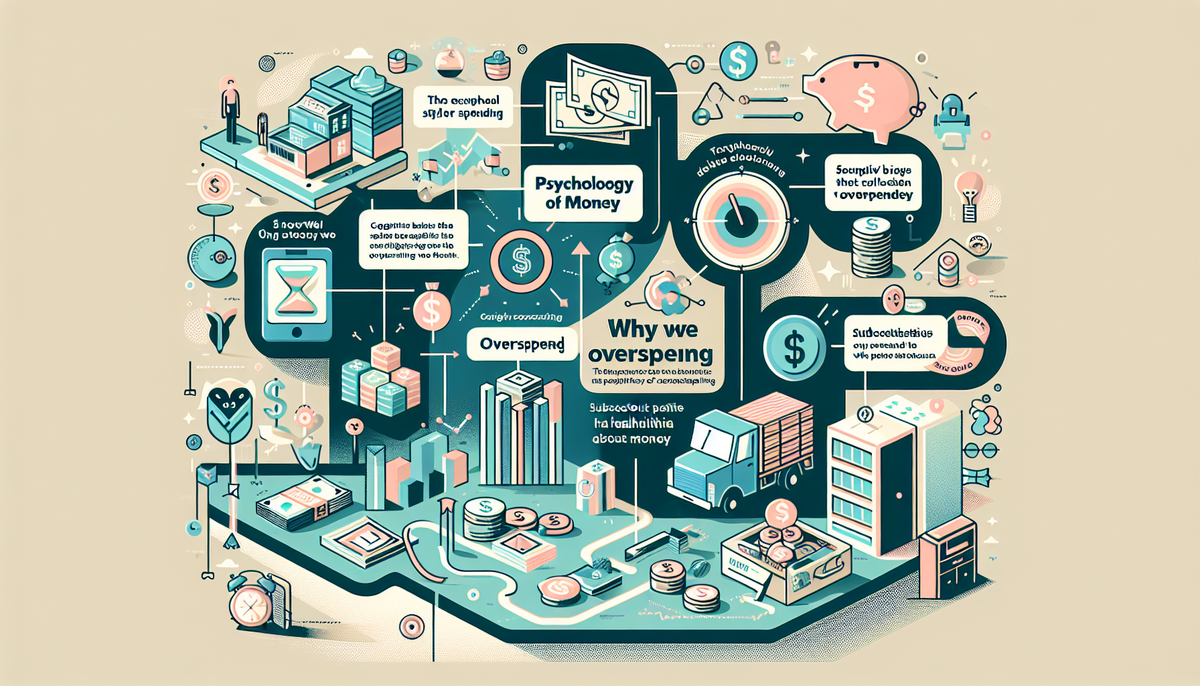The Psychology of Money: Why We Overspend

The Psychology of Money: Why We Overspend
Overspending is a common financial challenge that many people struggle with. Despite the best intentions, our spending habits often veer off course, leaving us with regret and financial stress. This dilemma is deeply intertwined with financial psychology, a field that delves into how our emotions, thoughts, and beliefs impact our financial behavior. The purpose of this article is to explore the hidden reasons behind our spending habits, diving into the emotional and cognitive factors that drive us to overspend.
The Emotional Triggers of Spending
Emotions play a significant role in shaping our financial decisions. Understanding these emotional triggers can help us recognize why we may be prone to overspend.
Stress and "Retail Therapy"
When life gets overwhelming, many turn to shopping as a form of "retail therapy." The act of buying something new can provide a temporary mood boost and a sense of control, albeit short-lived. This behavior is driven by the need to alleviate stress and find immediate comfort, often leading to unnecessary purchases and overspending.
The High of Instant Gratification
The allure of instant gratification is a powerful motivator for overspending. With a simple swipe of a card or click of a button, purchasing something new gives us an immediate dopamine rush. This sensation can be addictive, leading us to prioritize short-term pleasure over long-term financial stability.
Social Comparison and the "Fear of Missing Out" (FOMO)
In a world dominated by social media, comparing our lives to others is easier than ever. FOMO, or the fear of missing out, can drive us to spend money to keep up with trends or experiences our peers are enjoying. This social pressure can lead to purchasing things we don't need or genuinely want, simply to avoid feeling left out.
Cognitive Biases That Empty Your Wallet
Our brains rely on cognitive biases, or mental shortcuts, to make quick decisions. While these biases can be useful, they also contribute to poor financial choices, such as overspending.
The Anchoring Effect: First Price is the Best Price?
When shopping, the first price we see often becomes an anchor, influencing our perception of value. This bias can lead us to overspend, as we might hastily purchase an item assuming it's a good deal, rather than seeking out alternatives or evaluating if it's worth the cost.
Herd Mentality: If Everyone's Buying It...
Herd mentality occurs when we follow the crowd, assuming that if others are buying something, it must be worthwhile. This bias can lead us to make impulsive purchases without fully considering their necessity or value.
The Scarcity Mindset: Get It Before It's Gone!
The scarcity mindset is triggered when we perceive an item is limited in availability. This bias creates a sense of urgency, compelling us to buy immediately for fear of missing out on something rare, even if the item is not essential.
Your Money Mindset: Uncovering Subconscious Beliefs
Our money mindset is shaped by deep-seated beliefs that often operate below the surface, influencing our spending behavior in profound ways.
Childhood Influences and Money Beliefs
Our attitudes towards money are often formed in childhood, based on familial influences and early experiences. These beliefs can manifest as subconscious scripts that dictate how we handle our finances, leading to patterns of overspending if not consciously addressed.
Aligning Spending with Your Core Values
To develop a healthier relationship with money, it's essential to align spending habits with personal values. When spending reflects what truly matters, it becomes easier to make mindful financial choices that support long-term goals rather than succumbing to impulsive spending.
Conclusion: Towards a Healthier Financial Future
Understanding the psychological factors that drive overspending can empower us to take control of our financial habits. By recognizing emotional triggers, cognitive biases, and underlying beliefs about money, we can begin to practice mindful spending. This intentional approach enables us to align our financial habits with our core values and long-term objectives. By prioritizing mindful spending, we can pave the way towards a healthier financial future, free from the unnecessary burdens of overspending.




